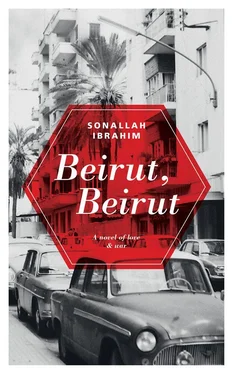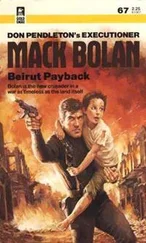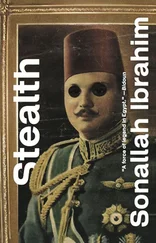‘‘The car took us a little way, and then stopped. That’s when I saw them bringing out a young man whose name was Muhammad Karum. After they got tired of beating him, they tied his legs to two cars, and his body was torn in half. As for my husband, who left through the mountains, we still haven’t heard anything about him.’’
Title card:
Feryal Shahrur, age 18.
“We ate nothing but lentils and dates. They would brew the tea with dates because there was so little sugar, but the tea ended up having no taste. The men would fight all day on only a little food and drink, and they would smoke rolled-up sage leaves and the leaves that birds eat…”
Title card:
Huriya Mustafa, age 20.
“On the day the heavy fighting started, my mother went out to fetch water, and suddenly she came upon a dead body on the ground. She went up to it, in the middle of all the bombs and rockets, and found that it was her son. Yes — it was my brother.
“On the day the camp fell, we came out by way of Dekwane. One of them came up to me and took one of my brothers. He hit him with the weapon in his hand until blood poured over his face. Then he emptied the bullets from his machinegun into his head. My brother turned toward us as if to say goodbye and fell to the ground a lifeless corpse. They took my third brother but my mother intervened to rescue him. She told them that two were enough, and to leave him to me because he was the youngest, but they paid no attention to her and shot him.
“They tried to take me with them but I refused. I didn’t budge an inch because I preferred to die. My mother intervened, pleading for help and crying. But they drove her off and opened fire on her, shooting her dead. I seized the opportunity: I picked up my youngest brothers and ran to escape.”
Title card:
Fatima al-Musa, age 45, mother of eight.
“I lost three of my sons, bearing in mind that my husband abandoned me, and didn’t help me with anything.”
Title card:
Fatima Badran, age 36, mother of nine sons.
“I went out while going to get water, and two days later my husband and sixteen-year-old son were martyred. My daughter Samira took care of me. She helped evacuate the wounded under heavy fire. She was hit in the neck and martyred instantly.
“When the camp fell to the enemy, I went out with my mother and father, and the rest of my children. They took my father and killed him. I turned to see him and saw him with blood gushing out of his body and his mouth as he shook on the ground. Just like the eight young men who were with us — they killed them all. I saw a boy with his mother: the gunmen took him and he was standing up against the wall, where the gunmen fired bullets into him from head to toe and he screamed, and his poor mother screamed, too, but they hit her with their rifle butts and they pushed us toward the Hotel School (Ecole Hotelière).
“We looked for a car that would take us to the Museum. The driver wanted 300 lira per passenger. We were shaking with fear: we didn’t have that much on us, so we waited for another car. That driver asked for 100 lira per passenger, so we got in and he took us as far as the Museum. They stood us up there against the wall and ordered us to cheer for Pierre Gemayel. They took four girls: they grabbed them by the arms and legs and threw them in the car, then they took my female cousin to a nearby room. She was pregnant and they forced her to take off her clothes and they tried to cut her stomach open…”
Title card:
Fawzi Shahrour, age 30.
“… I saw them rip open the stomach of a woman nine months pregnant, and in front of our eyes, the baby came out of her belly. The woman died instantly. Everyone was terrified, and no one could turn around to look…”
Title card:
Zaynab Umm Ali, age 40, mother of ten [continued].
‘‘… After he threatened me, he took my two daughters from me. He did that in order to rape them. I offered him all the money I had. I ran to his superior officer and kissed his feet, telling him, ‘Take anything but our honor’ — even after he had completely stripped my daughters before my eyes. I asked him, ‘Why are you doing this? You have no conscience if you’re going to machinegun the ten of us.’ One of them came and told him, ‘Let her go.’ Then they brought trucks. My children and I got in a truck. As we passed, they threw filthy water on us and slapped us with their shoes. We were driving over the corpses of young men and women. They gunned down eighteen young men at the Museum, sparing only women and children. They would ask women: how do you want your husband to die, by machinegun or a slit to the throat? A woman from al-Duqi was pulling her children along, but they stopped her and told her, ‘Bring your son here.’ She didn’t obey and started crying, so one of them beat her with the butt of his Kalashnikov and killed her son. They pulled out Abu Yasin and killed him right there in front of people. They ran the car over him and crushed him. They brought Suleiman, the military official for the Nationalist Front, and tied his legs to the truck and beat him.”
Title card:
A woman who was afraid to have her name used.
‘‘My husband and I and our family were sitting at home when we heard the sound of planes. So we and the neighbors who lived around us hurried to the shelter. A little later I saw my husband with three young men: they were saying, ‘Don’t be afraid, that’s not an Israeli plane circling overhead.’ So we weren’t afraid, because we knew it was a Syrian plane. We looked up at it and oh, the terror that was in store for us! It began bombing Tella al-Mir, and that’s when the slaughter began.’’
Title card:
Affaf Muhammad, age 32, mother of seven children, three still alive [continued].
‘‘… I carried my little daughter, who was no more than two weeks old, and my daughters Sonya and Abeer, who was only two. The rest of them held on to the hem of my dress. On the street, my children ended up without shoes. They walked over the rubble and glass, and blood ran from their feet until we reached the Hotel School. We stayed there from 4 am until 2 pm. My children were hungry and I’ll never forget the sound of Abeer’s voice as she says to me: ‘Mama, I want zaatar bread in a dish.’ ’’
Title card:
Fatima Mahmud, age 45.
“… They took the young men and lined them up in a single row with their faces to the wall, and began beating them on the back with wooden mallets until they fell down unconscious. They ordered some of them to kneel, and others to stand with their backs to the wall. They opened fire on the ones who were kneeling. Then they lit fires and heated iron bars in them until they were red-hot. Then they placed them in the shape of a cross on the stomachs of those who were standing. After that, they tied them up with ropes to cars and began dragging them around the streets. The women of that neighborhood were trilling the zaghareet at them and singing…”
Title card:
Jamila Qa’ur, age 32, mother of four girls.
‘‘… We got to the modern school and they started searching us. There was a Syrian officer with them. They found 75 lira on me and took it. Then the truck came. My children got in, followed by my mother and father, and finally me. I asked them about my daughters and they said that two of them got lost in the crowds of women and children. I began looking madly for them in the truck as I screamed in terror. After a few moments, I found them under people’s feet. The first had died and her body was blue, and the second was nearly dead. I started giving her first aid so I could save her life.
‘‘They made us get out of the truck on the highway. I wanted to get my daughter’s body out of the truck, but the gunmen refused and threatened to kill me. They wrapped her in the Lebanese cedar-tree flag and said, ‘Come on, take your daughter, give her to Yasser Arafat.’ Then they started shooting at us, even though we were standing next to the Syrians and Libyans in the Arab Security Forces, who didn’t lift a finger. In fact, we asked these troops for a little water for the children, but they refused, saying: ‘Now you’re making problems for us. Go get a drink somewhere else.’ So we kept clear of them until cars belonging to the resistance arrived. We got in, screaming, crying, and calling out, ‘Those poor Tel Zaatar boys!’ ’’
Читать дальше












